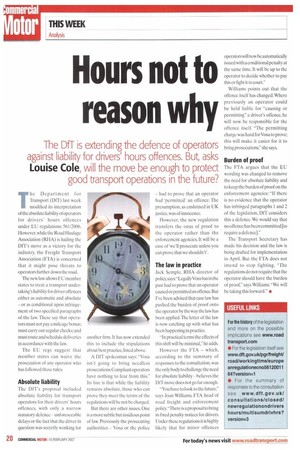ours not to reason why
Page 20

If you've noticed an error in this article please click here to report it so we can fix it.
The Dff is extending the defence of operators against liability for drivers' hours offences. But, asks Louise Cole, will the move be enough to protect good transport operations in the future?
The Department for Transport (DfT) last week modified its interpretation of the absolute liability of operators for drivers' hours offences under EU regulations 561/2006. However,while the Road Haulage Association (RHA) is hailing the DfT's move as a victory for the industry. the Freight Transport Association (FTA) is concerned that it might pose threats to operators further down the road.
The new law allows EU member states to treat a transport undertaking's liability for driver offences either as automatic and absolute — or as conditional upon infringement of two specified paragraphs of the law. These say that operators must not pay a mileage bonus; must carry out regular checks; and must route and schedule deliveries in accordance with the law.
The EU regs suggest that member states can waive the prosecution of any operator who has followed these rules.
Absolute liability
The Dff's proposal included absolute liability for transport operators for their drivers' hours offences, with only a narrow statutory defence — unforeseeable delays or the fact that the driver in question was secretly working for another firm. It has now extended this to include the stipulations about best practice, listed above.
A INT spokesman says: "Vosa isn't going to bring needless prosecutions. Compliant operators have nothing to fear from this." Its line is that while the liability remains absolute, those who can prove they meet the terms of the regulations will be not be charged.
But there are other issues. One is a more subtle but insidious point of law. Previously the prosecuting authorities — Vosa or the police — had to prove that an operator had 'permitted' an offence. The presumption, as enshrined in UK justice, was of innocence.
However, the new regulation transfers the onus of proof to the operator rather than the enforcement agencies. It will be a case of 'we'll prosecute unless you can prove that we shouldn't'.
The law in practice
Jack Semple, RHA director of policy, says:"LegallyVosa has in the past had to prove that an operator caused or permitted an offence. But I've been advised that case law has pushed the burden of proof onto the operator by the way the law has been applied. The letter of the law is now catching up with what has been happening in practice.
"In practical terms the effects of this shift will be minimal," he adds.
However the FTA — which, according to the summary of responses to the consultation, was the only body tochallenge the need for absolute liability believes the DfT' move does not go far enough.
"You have to look to the future," says Joan Williams, FTA head of road freight and enforcement policy. There is a proposal to bring in fixed penalty notices for drivers Under these regulations it is highly likely that for minor offences operators will now be automatically issued with a conditional penalty at the same time. It will be up to the operator to decide whether to pay this or fight it in court."
Williams points out that the offence itself has changed. Where previously an operator could be held liable for "causing or permitting" a driver's offence, he will now be responsible for the offence itself. "The permitting charge was hard for Vosa to prove; this will make it easier for it to bring prosecutions," she says.
Burden of proof
The FTA argues that the EU wording was changed to remove the need for absolute liability and to keep the burden of proof on the enforcement agencies: "If there is no evidence that the operator has infringed paragraphs 1 and 2 of the legislation, DfT considers this a defence. We would say that no offence has been committed [to require a defence]."
The Transport Secretary has made his decision and the law is being drafted for implementation in April. But the FTA does not intend to stop fighting. "The regulations do not require that the operator should have the burden of proof," says Williams. "We will be taking this forward." •


























































































































































































